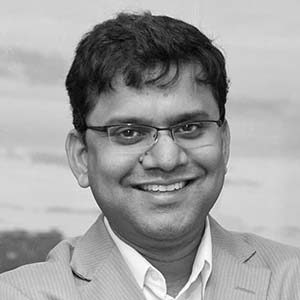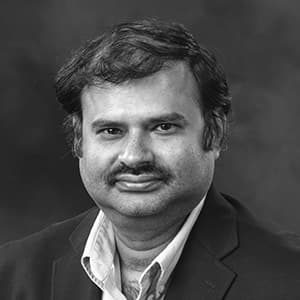
Fragile Earth 2021
Accelerating progress
towards equitable sustainability

Fragile Earth at ACM's KDD Virtual 2021 Conference
The 5th edition of Fragile Earth will bring together the research community, industry, and policymakers to develop radically new technological foundations for advancing and meeting the Sustainable Development Goals in a way that ensures equitable and inclusive progress.
The last year has given us a glimpse of the devastation global crises can create. However, global mitigation efforts illustrate how lessening consumption, travel, and even work levels are possible and can have positive spill-over effects.
The technological challenges posed by these development goals are twofold: how to achieve accurate, robust, and scalable modeling on physical, environmental, system, and societal data, and how to ensure that the obtained models are socially acceptable in the chosen context.
Fragile Earth 2021 - Presentations
Fragile Earth 2021 - Meet the Presenters
Read the blog post introducing this year's panelists and keynote speakers.
Research Papers from KDD 2021
Position Paper: Reducing Amazon’s packaging waste using multimodal deep learning
By Prasanth Meiyappan and Matthew Bales
Model Generalization in Deep Learning Applications for Land Cover Mapping
By Lucas Hu, Caleb Robinson, and Bistra Dilkina
Beyond modeling: NLP Pipeline for efficient environmental Policy Analysis
By Jordi Planas, Daniel Firebanks-Quevedo, Galina Naydenova, Ramansh Sharma, Cristina Taylor, Kathleen Buckingham, and Rong Fang
Space, Time, and Counts: Improved Human vs Animal Detection in Thermal Infrared Drone Videos for Prevention of Wildlife Poaching
By Anika Puri and Elizabeth Bondi
Detecting Cattle and Elk in the Wild from Space
By Caleb Robinson, Anthony Ortiz, Lacey Hughey, Jared A. Stabach, and Juan M. Lavista Ferres
Global Metagenomic Data from MetaSUB Enables City-specific Microbial Fingerprinting
By Chandrima Bhattacharya, Malay Bhattacharyya, Bodhisatwa Bhattacharya, and Christopher E. Mason
A network fusion model pipeline for multi-modal, deep learning for tree crown detection
By Rebekah Loving, Arushi Agarwal, Ilya Sherstyuk, and Sergio Parra
A Design Framework for Citizen-Science AI Platforms for Families
By Fangqing He*, Yifeng Wang*, and Stefania Druga
Programme
Aug. 14: 9:00pm-12:00am (EDT)
9:00pm – 9:10: Intro
9:10 – 9:40: Keynote 1: The Need for Trustworthy AI for Weather to Facilitate Sustainability in our Changing Climate
Artificial Intelligence (AI) and Machine Learning (ML) have demonstrated that they can be used to improve prediction across a wide variety of environmental science phenomena. However, there is a fundamental lack of trust of the algorithms by scientific end-users, including decision makers such as forecasters and emergency managers, especially in life-or-death situations. The NSF AI Institute for Research on Trustworthy AI in Weather, Climate, and Coastal Oceanography (AI2ES) is creating novel trustworthy AI for a variety of weather, climate, and coastal oceanography applications. To do this, we are developing our novel AI methods in collaborative work with both atmospheric scientists and social scientists, who study the needs and perceptions of scientific ends users about the AI/ML methods.
As the climate is changing and high-impact events become more common and impactful, it is important that any AI we develop is developed and used in an ethical and responsible manner. This includes ensuring that the AI focuses on environmental justice and provides solutions for all populations, particularly the disadvantaged populations that are often even more impacted by climate change and extreme weather. In this talk, we also discuss AI2ES’s work to develop ethical and responsible AI for weather and climate applications.
Lloyd G. and Joyce Austin Presidential Professor, School of Computer Science and School of Meteorology
University of Oklahoma
9:40 – 9:50: Q&A
9:50 – 10:45: Session 1: Machine Learning for the Natural World
- Paper 1: Detecting Cattle and Elk in the Wild from Space
- Authors: Caleb Robinson, Anthony Ortiz, Lacey Hughey, Jared A. Stabach, Juan M. Lavista Ferres
- Paper 2: Global Metagenomic Data from MetaSUB Enables City-specific Microbial Fingerprinting
- Authors: Chandrima Bhattacharya, Malay Bhattacharyya, Bodhisatwa Bhattacharya, Christopher E. Mason
- Paper 3: A network fusion model pipeline for multi-modal, deep learning for tree crown detection
- Authors: Rebekah Loving, Arushi Agarwal, Ilya Sherstyuk, Sergio Parra
10:45 – 11:00: Break
11:00 – 12:00: AI Sustainability Leaders Panel Discussion
- Topher White, CEO at rtcx
- Emily Charry Tissier, CEO at Whale Seeker
- Indra den Bakker, CEO at Overstory
- Alma Cardenas, Founding Member & Sr Manager at Microsoft AI for Earth
- Aymeric Maudous, CEO & Founder at Lord of the Trees
- Evan Henry, Co-Founder at Nectar
Aug. 15: 5:00pm-9:00pm (EDT)
5:00pm – 5:55: Session 2: Artificial intelligence for Progress in Sustainability and Society
- Paper 1: Reducing Amazon’s packing waste using multimodal deep learning
- Authors: Prasanth Meiyappan, Matthew Bales
- Paper 2: A Design Framework for Citizen-Science AI Platforms for Families
- Authors: Fangqing He*, Yifeng Wang*, Stefania Druga
- Paper 3: Beyond modeling: NLP Pipeline for efficient environmental Policy Analysis
- Authors: Jordi Planas, Daniel Firebanks-Quevedo, Galina Naydenova, Ramansh Sharma, Cristina Taylor, Kathleen Buckingham, Rong Fang
5:55 – 6:10: Break
6:10 – 6:40: Keynote 2: Big Data in Climate and Environmental Sciences: Challenges and Opportunities for Data Science
The climate and environmental sciences have recently undergone a rapid transformation from a data-poor to a data-rich environment. In particular, massive amount of data about Earth and its environment is now continuously being generated by a large number of Earth observing satellites as well as physics-based earth system models running on large-scale computational platforms. These massive and information-rich datasets offer huge potential for understanding how the Earth’s climate and ecosystem have been changing and how they are being impacted by humans actions. This talk will discuss various challenges involved in analyzing these massive data sets as well as opportunities they present for both advancing machine learning as well as the science of climate change in the context of monitoring the state of the tropical forests and surface water on a global scale.
6:40 – 6:50: Q&A
6:50 – 7:50: Session 3: Innovation in Resource and Conservation Management
- Paper 1: Sustaining Renewable Resources under Uncertainty
- Authors: Francois Buet-Golfouse
- Paper 2: Model Generalization in Deep Learning Applications for Land Cover Mapping
- Authors: Lucas Hu, Caleb Robinson, Bistra Dilkina
- Paper 3: Space, Time, and Counts: Improved Human vs Animal Detection in Thermal Infrared Drone Videos for Prevention of Wildlife Poaching
- Authors: Anika Puri, Elizabeth Bondi
7:50: Final Remarks
EDT: Eastern Daylight Time
Aug. 15: 2:00am-5:00am(CET)
2:00am – 2:10: Intro
2:10 – 2:40: Keynote 1: The Need for Trustworthy AI for Weather to Facilitate Sustainability in our Changing Climate
Artificial Intelligence (AI) and Machine Learning (ML) have demonstrated that they can be used to improve prediction across a wide variety of environmental science phenomena. However, there is a fundamental lack of trust of the algorithms by scientific end-users, including decision makers such as forecasters and emergency managers, especially in life-or-death situations. The NSF AI Institute for Research on Trustworthy AI in Weather, Climate, and Coastal Oceanography (AI2ES) is creating novel trustworthy AI for a variety of weather, climate, and coastal oceanography applications. To do this, we are developing our novel AI methods in collaborative work with both atmospheric scientists and social scientists, who study the needs and perceptions of scientific ends users about the AI/ML methods.
As the climate is changing and high-impact events become more common and impactful, it is important that any AI we develop is developed and used in an ethical and responsible manner. This includes ensuring that the AI focuses on environmental justice and provides solutions for all populations, particularly the disadvantaged populations that are often even more impacted by climate change and extreme weather. In this talk, we also discuss AI2ES’s work to develop ethical and responsible AI for weather and climate applications.
Lloyd G. and Joyce Austin Presidential Professor, School of Computer Science and School of Meteorology
University of Oklahoma
2:40 – 2:50: Q&A
2:50 – 3:45: Session 1: Machine Learning for the Natural World
- Paper 1: Detecting Cattle and Elk in the Wild from Space
- Authors: Caleb Robinson, Anthony Ortiz, Lacey Hughey, Jared A. Stabach, Juan M. Lavista Ferres
- Paper 2: Global Metagenomic Data from MetaSUB Enables City-specific Microbial Fingerprinting
- Authors: Chandrima Bhattacharya, Malay Bhattacharyya, Bodhisatwa Bhattacharya, Christopher E. Mason
- Paper 3: A network fusion model pipeline for multi-modal, deep learning for tree crown detection
- Authors: Rebekah Loving, Arushi Agarwal, Ilya Sherstyuk, Sergio Parra
3:45 – 4:00: Break
4:00 – 5:00: AI Sustainability Leaders Panel Discussion
- Topher White, CEO at rtcx
- Emily Charry Tissier, CEO at Whale Seeker
- Indra den Bakker, CEO at Overstory
- Alma Cardenas, Founding Member & Sr Manager at Microsoft AI for Earth
- Aymeric Maudous, CEO & Founder at Lord of the Trees
- Evan Henry, Co-Founder at Nectar
Aug. 15: 10:00pm-2:00am (CET)
10:00am – 10:55: Session 2: Artificial intelligence for Progress in Sustainability and Society
- Paper 1: Reducing Amazon’s packing waste using multimodal deep learning
- Authors: Prasanth Meiyappan, Matthew Bales
- Paper 2: A Design Framework for Citizen-Science AI Platforms for Families
- Authors: Fangqing He*, Yifeng Wang*, Stefania Druga
- Paper 3: Beyond modeling: NLP Pipeline for efficient environmental Policy Analysis
- Authors: Jordi Planas, Daniel Firebanks-Quevedo, Galina Naydenova, Ramansh Sharma, Cristina Taylor, Kathleen Buckingham, Rong Fang
10:55 – 11:10: Break
11:10 – 11:40: Keynote 2: Big Data in Climate and Environmental Sciences: Challenges and Opportunities for Data Science
The climate and environmental sciences have recently undergone a rapid transformation from a data-poor to a data-rich environment. In particular, massive amount of data about Earth and its environment is now continuously being generated by a large number of Earth observing satellites as well as physics-based earth system models running on large-scale computational platforms. These massive and information-rich datasets offer huge potential for understanding how the Earth’s climate and ecosystem have been changing and how they are being impacted by humans actions. This talk will discuss various challenges involved in analyzing these massive data sets as well as opportunities they present for both advancing machine learning as well as the science of climate change in the context of monitoring the state of the tropical forests and surface water on a global scale.
11:40 – 11:50: Q&A
11:50 – 12:50: Session 3: Innovation in Resource and Conservation Management
- Paper 1: Sustaining Renewable Resources under Uncertainty
- Authors: Francois Buet-Golfouse
- Paper 2: Model Generalization in Deep Learning Applications for Land Cover Mapping
- Authors: Lucas Hu, Caleb Robinson, Bistra Dilkina
- Paper 3: Space, Time, and Counts: Improved Human vs Animal Detection in Thermal Infrared Drone Videos for Prevention of Wildlife Poaching
- Authors: Anika Puri, Elizabeth Bondi
12:50: Final Remarks
CEST: Central European Time
Aug. 15: 9:00am-12:00pm (SG)
9:00am – 9:10: Intro
9:10 – 9:40: Keynote 1: The Need for Trustworthy AI for Weather to Facilitate Sustainability in our Changing Climate
Artificial Intelligence (AI) and Machine Learning (ML) have demonstrated that they can be used to improve prediction across a wide variety of environmental science phenomena. However, there is a fundamental lack of trust of the algorithms by scientific end-users, including decision makers such as forecasters and emergency managers, especially in life-or-death situations. The NSF AI Institute for Research on Trustworthy AI in Weather, Climate, and Coastal Oceanography (AI2ES) is creating novel trustworthy AI for a variety of weather, climate, and coastal oceanography applications. To do this, we are developing our novel AI methods in collaborative work with both atmospheric scientists and social scientists, who study the needs and perceptions of scientific ends users about the AI/ML methods.
As the climate is changing and high-impact events become more common and impactful, it is important that any AI we develop is developed and used in an ethical and responsible manner. This includes ensuring that the AI focuses on environmental justice and provides solutions for all populations, particularly the disadvantaged populations that are often even more impacted by climate change and extreme weather. In this talk, we also discuss AI2ES’s work to develop ethical and responsible AI for weather and climate applications.
Lloyd G. and Joyce Austin Presidential Professor, School of Computer Science and School of Meteorology
University of Oklahoma
9:40 – 9:50: Q&A
9:50 – 10:45: Session 1: Machine Learning for the Natural World
- Paper 1: Detecting Cattle and Elk in the Wild from Space
- Authors: Caleb Robinson, Anthony Ortiz, Lacey Hughey, Jared A. Stabach, Juan M. Lavista Ferres
- Paper 2: Global Metagenomic Data from MetaSUB Enables City-specific Microbial Fingerprinting
- Authors: Chandrima Bhattacharya, Malay Bhattacharyya, Bodhisatwa Bhattacharya, Christopher E. Mason
- Paper 3: A network fusion model pipeline for multi-modal, deep learning for tree crown detection
- Authors: Rebekah Loving, Arushi Agarwal, Ilya Sherstyuk, Sergio Parra
10:45 – 11:00: Break
11:00 – 12:00: AI Sustainability Leaders Panel Discussion
- Topher White, CEO at rtcx
- Emily Charry Tissier, CEO at Whale Seeker
- Indra den Bakker, CEO at Overstory
- Alma Cardenas, Founding Member & Sr Manager at Microsoft AI for Earth
- Aymeric Maudous, CEO & Founder at Lord of the Trees
- Evan Henry, Co-Founder at Nectar
Aug. 16: 5:00am-9:00am (SG)
5:00am – 5:55: Session 2: Artificial intelligence for Progress in Sustainability and Society
- Paper 1: Reducing Amazon’s packing waste using multimodal deep learning
- Authors: Prasanth Meiyappan, Matthew Bales
- Paper 2: A Design Framework for Citizen-Science AI Platforms for Families
- Authors: Fangqing He*, Yifeng Wang*, Stefania Druga
- Paper 3: Beyond modeling: NLP Pipeline for efficient environmental Policy Analysis
- Authors: Jordi Planas, Daniel Firebanks-Quevedo, Galina Naydenova, Ramansh Sharma, Cristina Taylor, Kathleen Buckingham, Rong Fang
5:55 – 6:10: Break
6:10 – 6:40: Keynote 2: Big Data in Climate and Environmental Sciences: Challenges and Opportunities for Data Science
The climate and environmental sciences have recently undergone a rapid transformation from a data-poor to a data-rich environment. In particular, massive amount of data about Earth and its environment is now continuously being generated by a large number of Earth observing satellites as well as physics-based earth system models running on large-scale computational platforms. These massive and information-rich datasets offer huge potential for understanding how the Earth’s climate and ecosystem have been changing and how they are being impacted by humans actions. This talk will discuss various challenges involved in analyzing these massive data sets as well as opportunities they present for both advancing machine learning as well as the science of climate change in the context of monitoring the state of the tropical forests and surface water on a global scale.
6:40 – 6:50: Q&A
6:50 – 7:50: Session 3: Innovation in Resource and Conservation Management
- Paper 1: Sustaining Renewable Resources under Uncertainty
- Authors: Francois Buet-Golfouse
- Paper 2: Model Generalization in Deep Learning Applications for Land Cover Mapping
- Authors: Lucas Hu, Caleb Robinson, Bistra Dilkina
- Paper 3: Space, Time, and Counts: Improved Human vs Animal Detection in Thermal Infrared Drone Videos for Prevention of Wildlife Poaching
- Authors: Anika Puri, Elizabeth Bondi
7:50: Final Remarks
SG: Singapore Time
Organizers

Naoki Abe

Auroop Ganguly

Dr. Emre Eftelioglu

Bistra Dilkina

Kathleen Buckingham

Ramakrishnan Kannan

James Hodson
Share this Page
Get Involved
Join our efforts to unlock AI’s potential towards serving humanity.
Support us
Become a Partner
Volunteer with us
Newsletter


